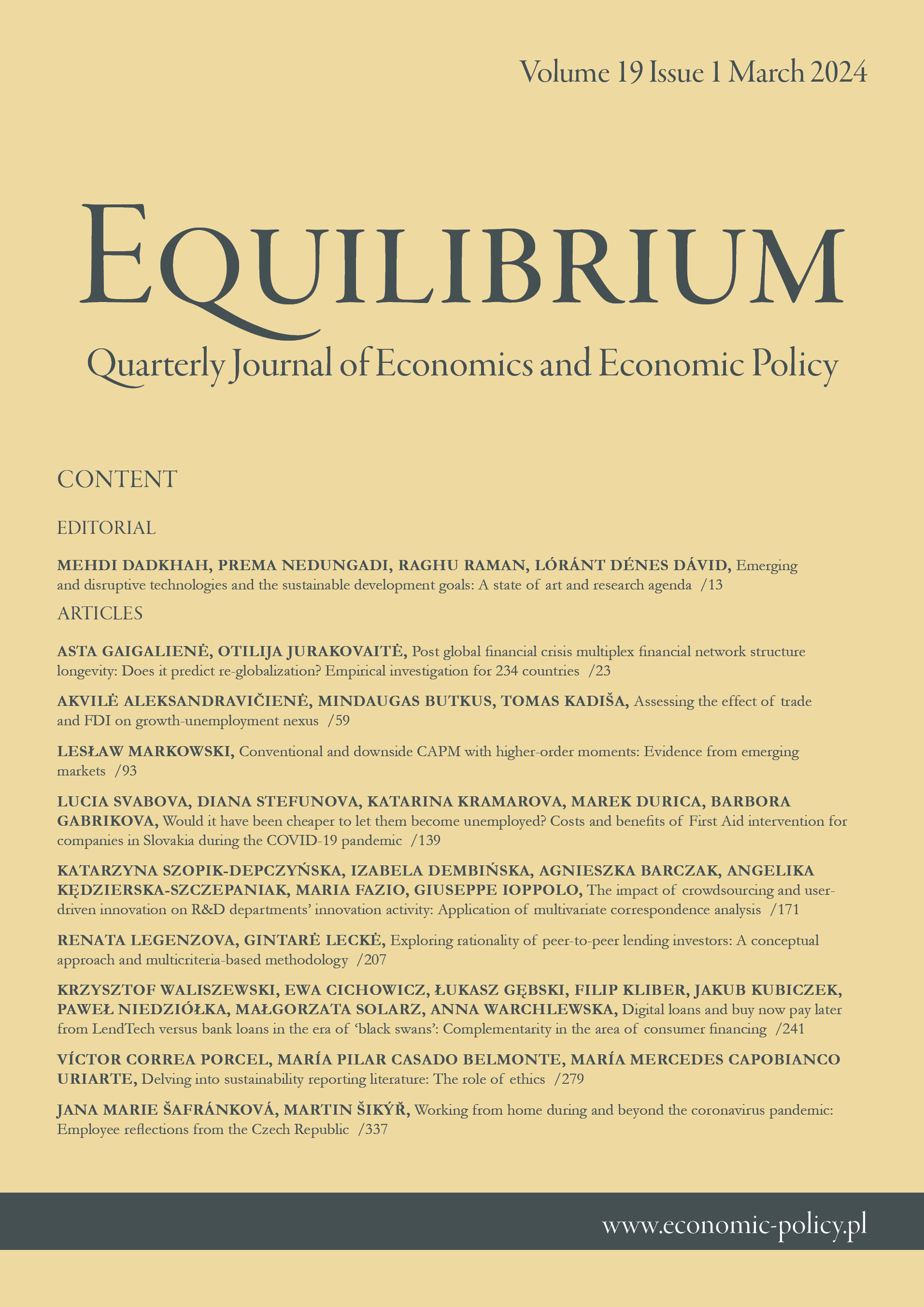Information Infrastructure as a Pillar of the Knowledge-based Economy - an Analysis of Regional Differentiation in Poland
IF 6.2
Q1 ECONOMICS
Equilibrium-Quarterly Journal of Economics and Economic Policy
Pub Date : 2018-03-31
DOI:10.24136/EQ.2018.007
引用次数: 28
Abstract
Research background: Information infrastructure is a very important pillar within a knowledge-based economy. The widespread use of information and communication technologies facilitates effective communication, dissemination and processing of information and knowledge. It also creates new opportunities for the effective use of knowledge and information in building competitive advantage. Information infrastructure is also a significant determinant in the development of territorial units, and therefore it affects the regional dimension of building the knowledge-based economy in Poland. Purpose of the article: The purpose of the study was to evaluate regional differentiation of the level of information infrastructure in Poland, and changes which occurred in this respect between 2010 and 2015. An attempt was made to provide an answer to the following question: Are regional differences in the level of information infrastructure in Poland increasing or decreasing, i.e. is a regional divergence or a regional convergence process taking place in this respect? Methods: Taxonomic methods were used, including linear ordering based on a synthetic variable and a method of grouping linearly-ordered objects. Findings & Value added: The regional differentiation of the level of information infra-structure in Poland has slightly decreased, which means, that a slow convergence process has taken place in this respect. This fact is confirmed by the value of the variation coefficient, which fell from a level of 17.6% in 2010 to a level of 14.4% in 2015. Convergence processes were observed in twelve provinces. In the case of seven of them, they had the nature of a catching-up effect, and in the case of the remaining five — a lagging-behind effect. Divergence processes were observed in four provinces. The Dolnośląskie and Mazowieckie Provinces distanced themselves from other areas of the country. In the Malopolskie and Opolskie Provinces a marginalisation effect was observed.信息基础设施是知识经济的支柱——波兰地区差异分析
研究背景:信息基础设施是知识经济的重要支柱。信息和通信技术的广泛使用促进了信息和知识的有效沟通、传播和处理。它还为有效利用知识和信息以建立竞争优势创造了新的机会。信息基础设施也是领土单位发展的重要决定因素,因此它影响到波兰建立知识经济的区域层面。文章的目的:本研究的目的是评估波兰信息基础设施水平的区域差异,以及2010年至2015年间在这方面发生的变化。试图回答以下问题:波兰信息基础设施水平的区域差异是在增加还是在减少,即在这方面正在发生区域分歧还是区域趋同进程?方法:采用基于合成变量的线性排序和线性排序对象分组的分类学方法。结果与附加值:波兰信息基础设施水平的区域差异略有下降,这意味着在这方面发生了缓慢的趋同过程。变异系数从2010年的17.6%下降到2015年的14.4%,证实了这一事实。在12个省观察到趋同过程。在其中的7个案例中,它们具有追赶效应的性质,而在剩下的5个案例中,它们具有滞后效应。在四个省观察到分化过程。Dolnośląskie和马佐维耶基省与该国其他地区保持距离。在马洛波尔斯基省和奥波尔斯基省观察到边缘化效应。
本文章由计算机程序翻译,如有差异,请以英文原文为准。
求助全文
约1分钟内获得全文
求助全文
来源期刊
CiteScore
9.20
自引率
3.50%
发文量
28
审稿时长
36 weeks
期刊介绍:
Equilibrium. Quarterly Journal of Economics and Economic Policy is a scientific journal dedicated to economics, which is the result of close cooperation between the Instytut Badań Gospodarczych/Institute of Economic Research (Poland) and Polish Economic Society and leading European universities. The journal constitutes a platform for exchange of views of the scientific community, as well as reflects the current status and trends of world science and economy.
The journal especially welcome empirical articles making use of quantitative methods in: Macroeconomics and Monetary Economics, International Economics, Financial Economics and Banking, Public Economics, Business Economics, Labor and Demographic Economics, Economic Development, and Technological Change, and Growth.
Current most preferable topics and special issues:
The economics of artificial intelligence: business potentials and risks;
Digitalization and entrepreneurship in economics;
Sustainable socio-economic development, environmental and ecological economics;
Transition in the energy market (improving energy efficiency, alternative energy sources, renewable energy, energy security).

 求助内容:
求助内容: 应助结果提醒方式:
应助结果提醒方式:


